MINDEMOYA—Ann Zylstra-Marissen sits at the table in the dining room of her immaculate apartment in the Sparrow’s Nest seniors building in Mindemoya and describes her long journey in creating her book ‘May the Favour of the Lord Rest Upon All Generations.’
The 100-page volume documents the histories of the various branches of her family in what is truly a labour of love. “Ever since our families immigrated to Canada there was talk about the origins of our ancestors,” she said. But like many Canadian families, most family members’s memories did not stretch beyond the sketchiest of details of the lives of their great grandparents. “We would ask each other where our grandparents came from,” she recalled. A few clues were available, such as her Grandmother Marrissen’s Low German words “so we knew she must have lived in Germany,” she said. “Grandfather Marrissen we knew nothing about. The same thing happened to all the other grandparents and ancestors.”
As all of the older relatives had passed beyond the reach of any inquiries, she began to explore the collection of old books her father had stored in his garage. Although those books did not directly relate to her family, the details contained within those tomes describing where her family originated helped put each member in context of their times and lives.
“I also wanted to write about church and civil politics,” she said. Ms. Zylstra-Marrisen bristled at the commonly held notion that the family’s ancestors had been illiterate. “How could they run a business where so much reading, writing and arithmetic would have been involved?” she asked.
“Ever since our families immigrated to Canada there was talk about the origins of our ancestors,” she said.
Ms. Zylstra-Marrisen admits that some of the “history” that she relates in her book as to the families’ lives is fictionalized. “For some of the families I had to fabricate stories,” she said, “but everything sounded very logical and believable.” As such, this is not a “history book, but a book of stories with I hope much history.”
A photograph on the front cover of the book shows the kind of homes that the farming families would have lived in during the 1700s. “Be sure to tell people that,” she laughs, “I wouldn’t want people thinking that is how they live now.”
Although the road leading to the homes is dirt, the homes themselves look quite cozy and robust, if rustic. The buildings are very apropos, as the earliest family entry dates to 1685 and peat bogs figure very prominently in the stories. Some ancestors made their living from the harvesting and sale of peat and turf, while others hewed fertile lands through the building of canals, ditches and dikes, digging the base sand and clay from beneath the beat bogs to create a wonderful soil. Think the Holland Marsh just north of Toronto, where early Dutch immigrants did the same in this country, and you will quickly get the idea.
Much of the research conducted by Ms. Zylstra-Marrisen in the writing of her book was of necessity done in Dutch, for the families largely hailed from the Low Country region of Europe encompassed by the modern-day Netherlands—still Holland to many.
The book stretches back eight generations in places and is liberally sprinkled with photographs of farms, churches and relatives and official documents.
Ms. Zylstra-Marrisen credits family tree created as a school project by her granddaughter Sarah Scott Quackenbush as one of the impetus of creating the book and cites the post genealogy of the Hospers-Brandorf family as being of great assistance.
In 1949, when Ms. Zylstra-Marrisen arrived in Canada as a small child with her family in the aftermath of World War II, they were fleeing a Holland still reeling from the horrors of that war. “Everything was still being rationed,” she recalled. Although the family has never pined for their homeland and are proud Canadians, having become citizens in 1955 after the five-year waiting period, they have retained many of their customs and culture even onto this day.
“Would we have been able to help our kids along if our parents had not taken us to Canada?” she wonders at her book’s conclusion. “Dutch culture stayed with us and some even transferred to our grandchildren, and we still speak Dutch as well as the local dialects we grew up with. We are also proud and thankful for the opportunities Canada offered us and our family.”




